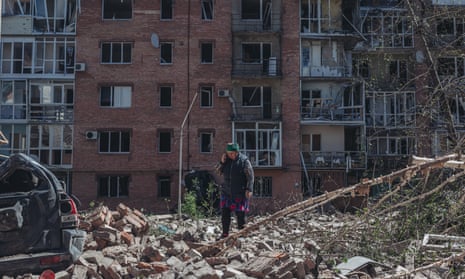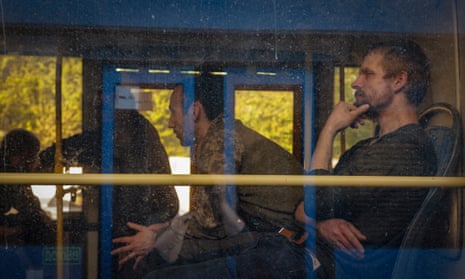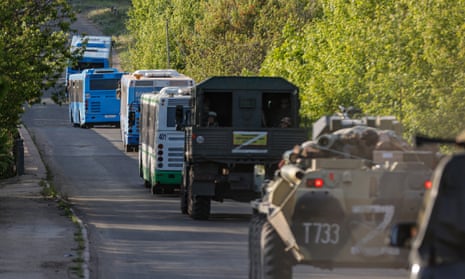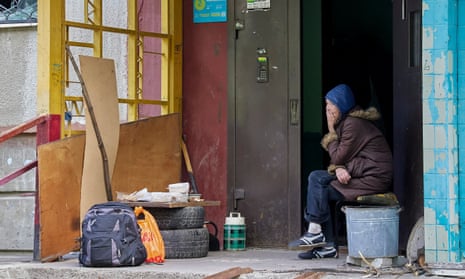Our live coverage of the Ukraine war is pausing for the time being, but you can find all of our reporting here. We will be back with a new blog in the coming hours.
Questions over future of evacuated Azovstal fighters – as it happened
This blog is now closed. Read latest updates in our new Russia-Ukraine war live blog here.
Tue 17 May 2022 19.41 EDT
First published on Tue 17 May 2022 00.00 EDT- Ukraine farming group calls for urgent end to ports blockade
- Summary
- Sweden and Finland to formally submit Nato bids ‘hand in hand’
- Today so far...
- Russia may be suffering ‘impressive losses’, says EU’s Borrell
- Duma appears to be trying to prevent Azovstal soldiers being part of prisoner swap
- Finland's parliament approves bid to join Nato
- Peace talks between Ukraine and Russia stalled
- 265 Ukrainian fighters surrendered at Azovstal, says Russian defence ministry
- Russian airstrike kills eight in Chernihiv, says state emergency service
- Today so far …
- Russian minister on peace talks: 'Ukraine has practically withdrawn from the negotiating process'
- Ukraine deputy PM: humanitarian operation continues in Azovstal
- Ukrainian soldiers evacuated from Mariupol steelworks
- Welcome summary
Live feed
- Ukraine farming group calls for urgent end to ports blockade
- Summary
- Sweden and Finland to formally submit Nato bids ‘hand in hand’
- Today so far...
- Russia may be suffering ‘impressive losses’, says EU’s Borrell
- Duma appears to be trying to prevent Azovstal soldiers being part of prisoner swap
- Finland's parliament approves bid to join Nato
- Peace talks between Ukraine and Russia stalled
- 265 Ukrainian fighters surrendered at Azovstal, says Russian defence ministry
- Russian airstrike kills eight in Chernihiv, says state emergency service
- Today so far …
- Russian minister on peace talks: 'Ukraine has practically withdrawn from the negotiating process'
- Ukraine deputy PM: humanitarian operation continues in Azovstal
- Ukrainian soldiers evacuated from Mariupol steelworks
- Welcome summary
A little more on the stalled peace negotiations between Russia and Ukraine, with some comments from Russian foreign minister Sergei Lavrov. Reuters reports Lavrov said he believes no peace deal can be made if negotiators try to “transfer the dialogue” to focus on what the West had to say instead of the immediate situation in Ukraine. That rules out chances for progress in talks, he added.
“We always say that we are ready for negotiations ... but we were given no other choice,” Lavrov said.
Ukraine and Russia have held intermittent peace talks since the end of February 2022, just days after Russia invaded its neighbour, but there has been little communication between them in recent weeks.
Here is a selection of images from Ukraine on day 83 of Russia’s invasion:





ICC sends ‘largest ever’ investigative team to Ukraine
The International Criminal Court on Tuesday has sent a 42-member team to Ukraine to probe alleged war crimes since the Russian invasion in what it called the largest such deployment in its history, AFP reports.
The squad comprises investigators, forensic experts and support staff and will work with Ukrainian authorities, said Karim Khan, the chief prosecutor of the Hague-based ICC.
“This represents the largest ever single field deployment by my office since its establishment,” ICC prosecutor Karim Khan said in a statement. The ICC was set up in 2002 to probe the world’s worst crimes.
US considers move to block Russian debt payments
The United States is considering blocking Russias ability to pay its US bondholders by allowing a key waiver to expire next week, a US administration official said on Tuesday, which could put Moscow closer to the brink of default, Reuters reports.
Russia has so far managed to make its international bond payments despite Western sanctions, which have complicated the process of paying. The country has $40bn of international bonds and last month made a late U-turn by making overdue bond payments to avoid default.
Russia has not defaulted on its external debt since the aftermath of its 1917 revolution and was rated investment grade up until its 24 February of Ukraine. Now Russia has a looming 25 May deadline when a US license allowing it to make payments is due to expire.
US creates unit to document Russian ‘war crimes’ in Ukraine
The US state department will create a new unit to research, document and publicise alleged war crimes by Russia in Ukraine.
The Conflict Observatory will “capture, analyze, and make widely available evidence of Russia-perpetrated war crimes and other atrocities in Ukraine,” the department said.
The Observatory will collect publicly and commercially available information, including what is seen on social media and commercial satellite imagery, for use in current and future civil and criminal legal processes.
Nearly three months after Russia invaded Ukraine, Kyiv says it has identified thousands of suspected war crimes cases. Most notorious have been the allegations murder of scores of civilians in Bucha, just outside Kyiv.
The Observatory will create an online platform “to help refute Russia’s disinformation efforts and shine a light on abuses,” the department said.
- The fate of more than 260 Ukrainian soldiers who have ended weeks of resistance at the Azovstal steelworks in Mariupol remains unclear, after the fighters surrendered and were transferred to Russian-controlled territory. Ukraine’s deputy defence minister said they would be swapped in a prisoner exchange, but some Russian officials said they could be tried or even executed.
- Eight people have died and 12 wounded after Russia launched a missile strike on the village of Desna in the northern Ukrainian region of Chernihiv, according to Ukraine’s state emergency service. The regional governor, Viacheslav Chaus, said Russia launched four missiles at around 5am local time on Tuesday. Two of the missiles hit buildings in the village, he said.
- Peace talks between Russia and Ukraine have stalled, according to both sides. Ukrainian negotiator, Mykhailo Podolyak, said negotiations with Russia have been suspended, blaming Moscow’s “stereotypical mindset”. Russia’s deputy foreign minister, Andrei Rudenko, said that virtually no peace talks are going on at the moment and blamed Ukraine for having “practically withdrawn” from the process.
- France’s president, Emmanuel Macron, promised his Ukrainian counterpart, Volodymyr Zelenskiy, that French arms deliveries to Kyiv would intensify in the coming days, the Élysée said. Zelenskiy said he had a “long and meaningful” conversation with Macron where they discussed “the course of hostilities, the operation to rescue the military from Azovstal and the vision of the prospects of the negotiation process”.
- The EU’s foreign policy chief, Josep Borrell, said Russian forces may have suffered “impressive losses” since their invasion of Ukraine. He told reporters: “If it is true that Russia has lost 15% of their troops since the beginning of the war, this is a world record of the losses of an army invading a country.” Borrell also said all EU member states will support Finland and Sweden in joining Nato.
- Finland’s parliament has overwhelmingly approved a government proposal to join Nato, a day after Sweden confirmed its intention to join the alliance. Finnish president, Sauli Niinistö, said he was sure both countries would overcome Turkish opposition to their historic membership bids.
- Niinistö and Sweden’s prime minister, Magdalena Andersson, will meet the US president, Joe Biden, on Thursday, the White House said. The leaders are expected to discuss Finland and Sweden’s Nato applications, European security and support for Ukraine amid Russia’s invasion, it said.
- Russia’s foreign minister, Sergei Lavrov, has said that Finland and Sweden joining Nato would probably make “not much difference”. The two Nordic countries “have been participating in Nato military exercises for many years,” Lavrov said.
- The Russian president, Vladimir Putin, has said that by abandoning Russian energy supplies, Europe risked paying the most expensive energy prices in the world. Speaking at a meeting with domestic oil managers and government officials, Putin said it was impossible for some European countries to quickly ditch Russian oil.
- Ukrainian president Volodymyr Zelenskiy gave a surprise address to open the Cannes Film Festival in France. Over video, Zelensky said that “it’s necessary for cinema not to be silent”.
- In a rare diversion from the Kremlin’s official line, Russian TV aired an interview with military analyst Mikhail Khodarenok, who said Russia’s situation “will clearly get worse”. Russia has tried to hide the scale of its losses and setbacks in Ukraine, aggressively censoring and prosecuting any who question the Kremlin’s claims that all is going according to plan.
– Léonie Chao-Fong, Lauren Aratani, Maanvi Singh
In yesterday’s nightly address, Ukrainian president Volodymyr Zelenskiy said that the military and intelligence officers had begun the operation to rescue Ukrainian troops from Mariupol, but the the work needs “delicacy and time”.
Meanwhile, he said, “we also maintain maximum diplomatic activity in other areas in the interests of Ukraine”. Zelenskiy said that in the mean time, Ukrainian troops are “repelling constant attacks in those areas where Russia is still trying to advance”, naming Severodonetsk and other cities in Donbas as main targets.
“We do everything to protect our land and our people,” he said.
Here’s the latest on Mariupol:
Correction: This post was amended to reflect that Zelenskiy’s comments were from yesterday night, local time in Ukraine.
In a rare diversion from the Kremlin’s official line, Russian TV aired an interview with Mikhail Khodarenok, a military analyst and retired colonel, during which he said that Russia’s situation “will clearly get worse” as Ukraine receives military assistance from the West.
“Ultimate victory on the battlefield is determined by the high morale of troops who are spilling blood for the ideas they are ready to fight for,” he said, according to the BBC. “The biggest problem with [Russia’s] military and political situation...is that we are in total political isolation and the whole world is against us, even if we don’t want to admit it. We need to resolve this situation.”
Russia has tried to hide the scale of its losses and setbacks in Ukraine, aggressively censoring and prosecuting any who question the Kremlin’s claims that all is going according to plan.
But the realities have leaked through occasionally, angering the families of Russian soldiers in Ukraine, as the Guardian’s Andrew Roth and Pjotr Sauer report:
Ukraine farming group calls for urgent end to ports blockade

One of Ukraine’s largest farming groups has called for an urgent solution to unblock the country’s Black Sea ports as exports of grain, sunflower and rapeseed are being held up by the Russian naval blockade, driving inflation and shortages around the world.
G7 ministers have held urgent talks about trying to open routes through Romanian and Baltic ports, potentially fed with an army of 10,000 trucks making a five-day trip from Ukraine.
John Rich, the chairman of MHP, which is listed on the London Stock Exchange, said: “If we had a UN agreement in place it would solve an enormous amount of issues.” But he said that without the war ending such a deal was unlikely, piling pressure on prices for grain and seeds used for cooking oil and ethanol around the world into next year.
“We are now in a vicious cycle,” Rich said. “Normally what happens is that farmers cure high prices as [when prices go up] farmers produce more and prices collapse. This time it could be different,” Rich said pointing to a combination of climate change, the Covid pandemic, the war in Ukraine, as well as fertiliser shortages which are hitting production around the world.
He said the world could be looking at a “cascade of export bans”, following India’s block on the export of wheat and Indonesia’s block on palm oil exports, raising the prospect that “the whole concept of globalisation in food production is dead”.
Exports from Ukraine, which produces as much as half the world’s sunflower seeds, a tenth of wheat and up to a fifth of barley and rapeseed, have been severely interrupted by the closure of Ukraine’s ports following Russia’s invasion. Only about 1m tonnes of grain and seed were exported in April compared with more than 5m tonnes of grain and 700,000 tonnes of oilseeds a month in a typical year.
Before the war, about 80% of Ukraine’s grain and oilseeds were exported via the Black Sea but that route is now cut off, creating a bottleneck as farmers prepare to harvest the summer crops.
Efforts are being made to increase the pace of exports, by increasing the use of trucks and improving rail capacity and links, which are hampered by differing track gauges in Ukraine and neighbouring countries. However, Rich said road and rail could replace little more than a quarter of the capacity that once flowed through Ukraine’s ports and would take time to develop.
Read more:
Recently released footage purports to show Ukrainian soldiers leaving the Azovstal steelworks in Mariupol as Ukraine confirmed that more than 260 fighters were evacuated from the plant and taken to areas under Russia’s control.
The videos – released by the self-proclaimed Donetsk People’s Republic and Russia’s defence ministry – show people being carried on stretchers. The Guardian has been unable to verify the date or conditions under which this footage was shot
The Economist has a great interactive on how powerful Vladimir Putin’s grasp on the media in Russia is, essentially controlling a huge propaganda machine.
The story goes through what a typical Russian citizen is reading and watching as Russia’s invasion of Ukraine continues. Here’s an excerpt:
As Mr Putin’s regime shifts from a relatively open authoritarianism towards a more closed dictatorship, its propaganda is changing, too. Television hosts and guests present the “special military operation” as part of a grander conflict in defence of Russia. State media have long intoned about the West’s supposed intention to undermine Russia and Mr Putin’s efforts to protect the motherland. But where propaganda once sought mostly to breed passivity, cast doubt on reality and discourage political participation, it increasingly seeks to mobilise popular support for Mr Putin’s war, by convincing people that Russia is under attack and victory is the only way out. “The old rules of authoritarian life are breaking down, active participation is being demanded,” says Greg Yudin, a sociologist.
Dramatic video shows a community center in Derhachi, near Kharkiv, that has been puvlarized by Russian missiles. The community center was handing out humanitarian aid to local residents.
This community center in Derhachi near Kharkiv, where humanitarian aid was distributed daily to hundreds of local residents, was hit twice by Russian rockets. Two people were killed, 4 wounded. Another Russian war crime to threaten people and destroy aid centers. pic.twitter.com/RTL3ZE6jdW
— Maria Avdeeva (@maria_avdv) May 17, 2022
Ukrainian president Volodymyr Zelenskiy just gave a surprise address to open the Cannes Film Festival in France.
Over video, Zelensky said that “it’s necessary for cinema not to be silent”, according to the Hollywood Reporter. Zelenskiy cited several movies, including Charlie Chaplin’s The Great Dictator and said that such movies were “horrific documentaries and newsreels”. But, ironically, “the most brutal dictators of the 20th century loved cinema”.
“I’m sure that the dictator will lose,” Zelesnkiy said at the end of the address. “Glory to Ukraine.”
Look who addressed the Cannes Film Festival as it opened tonight! #zelensky #ukraine pic.twitter.com/oxVsOINhlP
— Eleanor Beardsley (@ElBeardsley) May 17, 2022